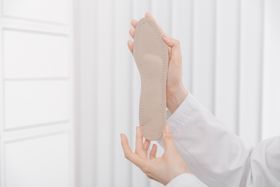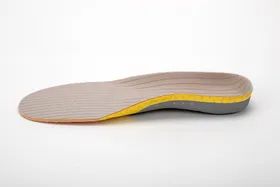Can Dry Skin Cause Burning Feet?
Learn more about the risks of having dry skin, how it can cause burning feet, and how to manage it effectively at home.
Updated January 2, 2023
Burning feet, or Grierson-Gopalan syndrome, is a condition characterized by the feet feeling hot and painful. It is usually caused by damage to the nerves in the feet and lower legs. Nerve damage leading to burning feet is often caused by health conditions such as diabetes, nerve entrapment, or Vitamin B12 deficiency.
Burning feet is also caused by hypothyroidism, which is associated with weight gain, swollen feet, fatigue, and dry skin on the feet. Nerve damage means that the skin and tissue is not supplied adequately with nerve input, which can lead to skin discoloration and changes in the skin's texture on the feet. The nerve damage also limits sensory feedback regarding temperature and sensation changes to the brain from the feet.
Risks of Dry Feet
- Pain or discomfort Cracked skin, especially around the heel, can cause pain if not tended to. Shoes that cause increased pressure on certain areas of the foot could lead to the development of cracks. Obesity and open-toed shoes may further increase the risk of developing cracked skin. Friction at the heel of the foot may increase dryness and cracking in the area too.
- Infection If your feet don't sweat enough, the skin may become dry and crack. Cracked skin from dryness is a potential site for infection as the fissure might be deep enough to pose a risk. Checking for redness, inflammation, and swelling is helpful in the early detection of an infection. It's important to keep the skin moist in an effort to prevent cracking or flakiness, especially in those with diabetes or obesity.
- Sensation of burning feet The feet can get extremely dry in cold and dry environments, which could lead to a burning sensation. The burning sensation can also arise from a host of other causes such as plantar fasciitis or peripheral neuropathy. Diabetes is a common cause of peripheral neuropathy, and is known to cause skin changes.
How to Relieve Dry Burning Feet
- Manage the main cause By managing this first step, you will prevent your condition and its symptoms from progressing and worsening. Conditions such as diabetes and hypothyroidism can be controlled to prevent any further nerve damage.
- Weight loss Weight loss can lessen the chances of cracked skin by reducing the pressure placed onto your feet on a daily basis.
- Regular foot care Looking after your feet can help to prevent any complications from arising. Clean your feet with mild soap and apply moisturizer to any dry skin. This will help to prevent cracking and potential infections. Using harsh soaps can damage your natural skin layer and increase dryness after showering or bathing.
- Foot soaking Soaking your feet in lukewarm water, patting them dry, and then applying moisturizer can be extremely helpful.
- Orthotics Orthotics provide cushioning for your feet and help to distribute your weight equally throughout your feet to lessen areas of high pressure where your skin has the potential to crack.
- Avoid going barefoot Try to avoid hard surfaces or objects that can cause your feet to crack when they make contact. If an open wound develops, it may progress into an infection. Consult with a medical professional regarding infected wounds that are slow to heal.
Related Articles

Orthotics for Bunions: How Insoles Can Relieve Bunion Pain
Babafemi Adebajo
February 28, 2022

3 Best Insoles for Walking All Day—Custom-Made by Top Podiatrists
Babafemi Adebajo
May 14, 2025

Vitamins for Shin Splints: How Supplements Can Aid Recovery
Babafemi Adebajo
October 1, 2025

Supination Custom Orthotics—2026 Review
Babafemi Adebajo
July 15, 2024

Best Insoles for Military Boots: Tactical Footwear Upgrades
Janik Sundstrom
October 11, 2024
Related Posts
Babafemi Adebajo
Common Causes of Burning Heels
Babafemi Adebajo
How to Stop Your Feet From Burning at Night
Janik Sundstrom



